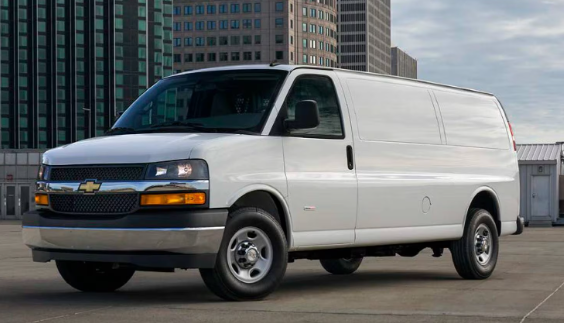This is what I believe to be, is the default van of the United States. The Chevrolet Express van has existed in its current state since 1995; with engine choices ranging from a 2.8L to 6.6L turbodiesel, and from 4.3L V8 to the quite frankly absurd 8.1L V8 petrol. America, the land of insanely cheap petrol, simple doesn't care about fuel efficiency in the same way that the rest of the world does and even the use of the term "minivan" refers to engine sizes of less than 300cid or about 4.9L.
There is no doubt about it, cars in the United States have always been bigger than everywhere else in the world, and the vans and pickup trucks are also bigger.
The Mercedes-Benz Sprinter, Ford Transit Connect, Ram ProMaster, Chevy Express (GMC Savana) are all massively more massive than the default van in Australia which is the Toyota Hiace but I had no idea just how much bigger. Of all of those vans, the smallest Chevy Express is 224 inches long, but of the normal vans in Australia, Toyota Hiace, Kia Bongo, Hyundai iLoad, Mitsubishi Express, Peugeot Expert, the biggest van was a mere 207 inches long. If the smallest van in the United States is a full foot longer than what we have in Australia, then that says that the rest of the van fleet is massively more massive.
When you also factor in the fact that the Chevy Express van is 16 inches wider than a Hiace, then this means that the default van size in the United States, occupies a space in the order of about 5136 cubic feet per vehicle which means that for every 6 million vehicles on the road, there is an entire cublic mile of air that needs to be accommodated for. Now that's find if you are building interstate highways where you have miles upon miles of free space full of nothing but in cities that were undesigned and which date from the 1700s and 1800s, you can not retrofit the world to take massively massive vehicles.
I have no doubt that for hauling cargo, a big van is immensely useful. Companies like DHL, UPS, FedEx, the US Mail, et cetera, would prefer having a big thing to cart goods around in because moving things in bulk is more efficient and therefore cheaper per unit. However, if you are a tradie, who has plumbing equipment, or a dog washer, or an electrician, or a butcher, or run a mowing company, then the need for a massively massive van is not so obvious. From what I can gather, big vans occupy the same space in the market that both vans and pantechs like the Isuzu 200 series occupy in Australia, and tradies kind of have to make do with pickup trucks which are less suited to the job.
A lot of this has to do with the so-called "chicken tax" which protects the American auto industry from having to compete with the outside world. The tax on imported vehicles is sufficiently large enough that it isn't worth the effort in a lot of cases to re-engineer otherwise profitable vehicles for the United States; this explains why companies like Mercedes-Benz, Audi, BMW, Lexus etc. can be bothered, as their vehicles are already sold at a premium, the price has a Veblen effect. But for trucks and vans, GM and Toyota won't bother, and Ford is able to make use of the rules but will still only sell massively massive versions of their Transit van.
On my way to work, I pass by several industrial complexes, the big fruit and vegetable market in Sydney, as well as crossing over and under a bunch of main roads. At work as an accountant, apart from the idle rich, the people who are paid a premium for the labour and the rich elderly, we also do the accounts for several tradespeople and they either have Toyota Hiaces or Mitsubishi Express vans. The Hiace came to be the default van in Australia because it is a well put together machine and because it fits nicely with having to be in an urban environment. I have no idea how much the Hiace shares DNA and architecture with the ubiquitous Camry but I imagine that there must be significant cross pollination.
This is what I find so brutally maddening about the Chevrolet Express van, and vans and pickups and traffic generally in the United States. Even in the land of cheap petrol, there is still that drive by business to maximise profits. I would have though that the profit motive, which is that underlying motive of all business since the beginning of time, would have been strong enough to demand smaller and cheaper vehicles which have smaller and cheaper running costs. A smaller van uses less petrol and likely incurs less in road taxes.
I don't get it. Is there something all a bit Scooby-Doo where people want to carry their friends around in zero comfort? Maybe this is like the A-Team, where the Chevy Astro van is used to covertly hide a small battle pack of renegades who have escaped into the underground? Do tradespeople have such dreams? Or is this because of years of bonkers choices by the auto makers, which have meant that the malaise-era never really went away. Of course I very much realise that I am playing with all kids of biases and am looking from the outside at a black-box and trying to work out why the outputs are the way they are but this is still madness.


No comments:
Post a Comment